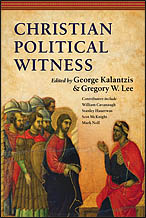Reviewed by Jacob Shatzer
Approaching the question of Christian political witness requires more than traditional experience and qualifications in formal politics. In fact, many avenues of Christian inquiry shed light on what it means to be Christ’s witnesses in politics. This book of collected essays from the 2013 Wheaton Theology Conference brings together Christian scholars from a variety of perspectives and disciplines to address aspects of Christian political witness. It is sort of a one-stop shop for a dozen helpful angles for Christian thinking on politics.
The weakness of this format is clear: so many perspectives, so little space for the necessary depth. Each chapter could be an entire book. One strength is related to this weakness, however: in many cases, the contributors have written entire books on the subject, and their contributions bring that knowledge to bear with focused, intriguing arguments. Such is the case with George Kalantzis’s chapter on the early church, Peter Leithart’s work on violence, and Daniel Bell’s reflections on just war. This book provides the reader with thoughtful reflection packed into tidy chapters of approximately 20 pages.
Each reader will gravitate to different chapters based on her own interest, and working through the entire book serves to increase one’s understanding of how many different elements –exegetical, theological, historical, and ethical – bear directly on questions of Christians and politics. Some of the more interesting contributions make less-than-obvious connections, such as Jana Bennett’s argument that “the current conversation, which tries to delineate how family, state and church are public or private, derails Christian discipleship” (113) and William Cavanaugh’s relation of corporate personhood in the church versus the business world.
In one of the final essays, ethicist David Gushee provides the practical perspective: while others dealt more exclusively in theory, Gushee’s contribution was to move through ten contemporary issues, addressing each in less than 400 words. The result is not a conclusive argument on any particular topic, but rather an emerging ethical vision applied to various hot-button issues. Gushee’s positions will inevitably run afoul of some standard evangelical sensibilities, but his ability to cover so many issues in such limited space serves the volume well because it connects the theoretical issues to the practical political questions of our world today.
In the end this book is quite unsatisfactory. But I think that fact is its greatest strength. Each contributor writes in a clear and compelling manner, relating their discipline and perspective to the question of Christian political witness. But the result is that the book creates a broad vision not only of the object of political witness or the challenges that Christians face, but also a broad vision of the treasure trove of resources that the Christian tradition provides for the task. The book is unsatisfactory because the reader won’t leave it satisfied. Instead, the reader will leave with renewed conviction about the importance of the church’s political witness and renewed confidence in the resources that the church has for that task.
Dr. Jacob Shatzer is Assistant Professor of Biblical and Theological Studies at Sterling College. He is also Book Review Editor for Ethics here at Books At a Glance.
Buy the books

Christian Political Witness